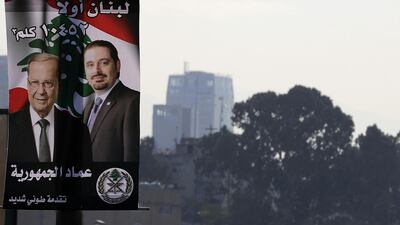Saad Hariri will head to Egypt on Tuesday after the Arab League accused Iran of “aggression” against Arab states.
Mr Hariri said this month in Riyadh that he was resigning as Lebanon's prime minister because of Iran’s “grip” on his country and fears of assassination.
Allies of Hizbollah, the Iran-backed militant group, which has members in Lebanon’s government, appeared to defend the organisation after it was roundly condemned at an Arab League meeting on Monday.
Lebanese president Michel Aoun, a Hizbollah ally, said Lebanon cannot accept suggestions that its government is a partner in acts of terrorism.
“Lebanon is not responsible for the Arab and regional conflicts that Arab countries are witnessing,” Mr Aoun told Arab League chief Ahmed Abul Gheit during their meeting in Beirut on Monday. “It has not attacked anyone and should not have to pay the price of these conflicts with its security and political stability.
"Lebanon has faced continuous assaults since 1978 until 2006 and was able to liberate its land. Israeli targeting still continues and it is the right of the Lebanese to resist it and foil its plans by all available means.”
Mr Hariri's visit to Egypt comes after the emergency meeting of Arab League foreign ministers in Cairo, where they discussed ways to combat Iranian interference in Arab affairs.
Mr Abul Gheit said on Monday that Lebanon should be "spared" from spiralling regional tensions, adding that nobody was accusing Lebanon’s government of terrorism or wanted to harm Lebanon.
"Arab countries understand and take into account the situation in Lebanon and want to spare it ... from any dispute," Mr Abul Gheit said after landing in Beirut, according to Lebanon's National News Agency
Bahrain’s foreign minister Sheikh Ahmed Al Khalifa told the Arab league meeting that Lebanese group Hizbollah is the biggest threat to security in the region.
After the meeting, Arab countries said they would address the UN security council’s president to clarify Iranian breaches of a resolution on Tehran’s ballistic missiles programme.
____________
Read more:
Arab League hears warning of growing Hizbollah threat
US and France agree on need to counter Iran influence in Middle East
Lebanese foreign minister to skip Arab League meeting, source says
____________
“The decision of the Arab League on Iranian intervention today was historical and sends a clear message on the effectiveness of joint Arab action,” Dr Anwar Gargash, Minister of State for Foreign Affairs, said late on Sunday.
Hizbollah, which was formed by Iran’s Revolutionary Guards and still receives financial and militarily assistance from Tehran, fought Israel’s occupation of Lebanon in the early 1980s. It has refused to disarm, saying it needs its weapons against continued Israeli aggression.
Mr Hariri — who has been outside of Lebanon since his resignation broadcast from Riyadh on November 4 — said he will meet Egyptian president Abdel Fattah El Sisi in Cairo on Tuesday. On Saturday, Mr Hariri was in Paris, where he met French president Emmanuel Macron.
Following his meeting with Mr Macron, Mr Hariri said he intends to head back to Beirut on Wednesday, when Lebanon celebrates its independence day.
Mr Aoun said he would not accept Mr Hariri's resignation until it is delivered in person amid calls for his speedy return. The resignation sparked a political crisis in Lebanon and put it on the front line of a regional power struggle between Saudi Arabia and Iran.
Riyadh and Tehran have for decades stood on opposing sides of conflicts in the Middle East, including Yemen and Syria — where Iran-backed Hizbollah militiamen are fighting alongside forces loyal to Syrian president Bashar Al Assad.
Regional tensions have escalated in recent weeks between Riyadh and Tehran over Mr Hariri's resignation and after a ballistic missile was fired at the kingdom by Houthi rebels in Yemen, who are also backed by Iran. Bahrain also accused Iran of being behind an oil pipeline explosion this month.
“The Lebanese Republic, in spite of our relations with it as a brotherly Arab nation, is under the total control of this terrorist party,” Bahrain's Sheikh Ahmed said, referring to Hizbollah.
Tehran dismissed on Monday the Arab League’s statement, saying it was “worthless”, the ISNA news agency reported.
Lebanese foreign minister Gebran Bassil —a member of the Hizbollah-allied Free Patriotic Movement and the Lebanese president’s son-in-law — did not attend the Cairo meeting. The country was represented by Antoine Azzam, the permanent representative to the Arab League, instead.
Lebanon was among the countries that voted in favour of the Arab League resolution, except for the points in which Hizbollah was mentioned.

